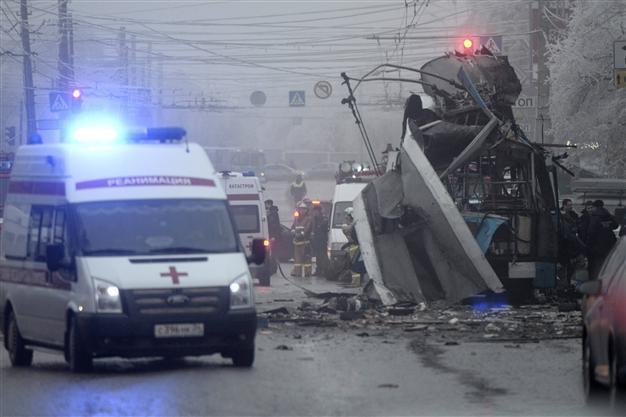Second suicide bomber in Russia's Volgograd kills 14 on trolleybus
VOLGOGRAD - Reuters

Members of the emergency services work at the site of a bomb blast on a trolleybus in Volgograd Dec. 30. REUTERS photo
A bomb ripped apart a trolleybus in Volgograd on Dec. 29, killing 14 people in the second deadly attack blamed on suicide bombers in the southern Russian city in 24 hours and raising fears of Islamist attacks on the Winter Olympics.President Vladimir Putin, who has staked his prestige on February's Sochi Games and dismissed threats from Chechen and other Islamist militants in the nearby North Caucasus, ordered tighter security nationwide after the morning rush-hour blast.
Investigators said they believed a male suicide bomber set off the blast, a day after a similar attack killed at least 17 in the main rail station of a city that serves as a gateway to the southern wedge of Russian territory bounded by the Black and Caspian Seas and the Caucasus mountains.
A Reuters journalist saw the blue and white trolleybus reduced to a twisted, gutted carcass, its roof blown off and bodies and debris strewn across the street. Windows in nearby apartments were blown out by the explosion, which investigators called a "terrorist act."
"For the second day, we are dying. It's a nightmare," a woman near the scene said, her voice trembling as she choked back tears. "What are we supposed to do, just walk now?"

Ulianov24 / Handout via Reuters
Health Ministry spokesman Oleg Salagai said 14 people were killed and 28 wounded in the bombing on Dec. 30.
There was no immediate claim of responsibility.
On Dec. 29, investigators initially described the station bomber as a woman from Dagestan, a hub of Islamist militancy on the Caspian, but they later said the attacker may have been a man. In October, a woman from the North Caucasus blew up and killed seven people on a bus in Volgograd.
Putin orders to upgrade security nationwide
Putin, who has not spoken publicly since the attacks, ordered a federal committee that coordinates counterterrorism efforts to step up security nationwide including in Volgograd, and to report to him daily, the Kremlin said.
The violence raises fears of a concerted campaign before the Olympics, which start on Feb. 7 around Sochi, a resort on the Black Sea, 700 km southwest of Volgograd.
In an online video posted in July, the Chechen leader of insurgents who want to carve an Islamic state out of the swathe of mainly Muslim provinces south of Volgograd, urged militants to use "maximum force" to prevent the Games from going ahead.
"Terrorists in Volgograd aim to terrorise others around the world, making them stay away from the Sochi Olympics," said Dmitry Trenin, an analyst with the Moscow Carnegie Centre.
The International Olympic Committee expressed condolences to those affected by the attacks and said "we have no doubt that the Russian authorities will be up to the task" of providing security at the Games.
"Unfortunately, terrorism is a global phenomenon and no region is exempt, which is why security at the Games is a top priority for the IOC," a spokeswoman for the International Olympic Committee in Lausanne, Switzerland.
Police said additional officers were being deployed to railway stations and airports nationwide after the bombing at the Volgograd rail station on Dec. 29, but the attacks raised questions about the effectiveness of security measures.
The police force in Volgograd, a city of a million people on the west bank of the river Volga, has been depleted as some 600 officers were redeployed to Sochi to tighten security around Olympic sites, a police officer told Reuters.
More attacks can be expected before the Olympics and cities in southern Russia where the Games are not being held are easier targets than Sochi, said Alexei Filatov, a prominent former member of Russia's elite anti-terrorism force, Alfa.
"The threat is greatest now because it is when terrorists can make the biggest impression," he said.
"The security measures were beefed up long ago around Sochi, so terrorists will strike instead in these nearby cities like Volgograd."
The Dec. 29 attack on the railway station was the deadliest to strike the ethnic Russian heartlands since January 2011, when a male suicide bomber from the North Caucasus killed 37 people in the arrivals hall of a busy Moscow airport.
















